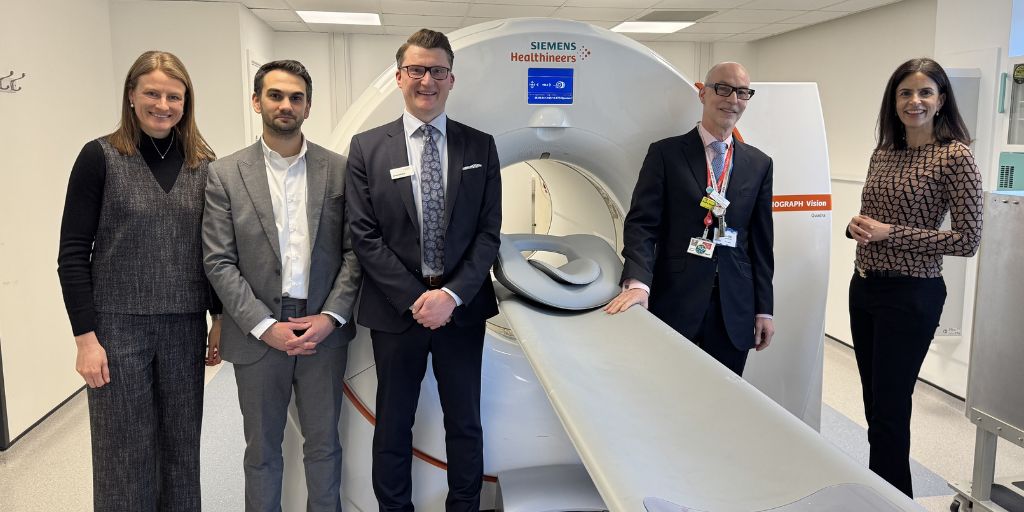
- King’s College London is the first in the UK to benefit from two Biograph Vision Quadra whole-body PET-CT systems, representing a major leap forward in medical imaging
- The technology will provide new insights and enhance the development of drugs and diagnostics for complex conditions like cancer, cardiovascular and neurological diseases
- As part of the National PET Imaging Platform, King’s College London will support transformational research to improve the calibre of care across the UK
King’s College London is the first in the UK to benefit from two Biograph Vision Quadra systems from Siemens Healthineers, marking a new era of PET-CT. This crucial, non-invasive imaging technique can detect diseases’ early onset, accelerating quality of care for patients while also enabling King’s to conduct innovative radiopharmaceutical, basic science and clinical research. As part of the UK’s first-of-its-kind National PET Imaging Platform (NPIP), a collaborative initiative bringing together transformational research for clinical discovery, King’s will use the whole-body PET-CT systems for research to improve the calibre of healthcare across the UK.
With PET-CT demand rising nearly 10% annually, this technological upgrade will help King’s meet this demand and significantly expand clinical and research capabilities, positioning King’s at the forefront of global PET-CT research. With higher sensitivity than existing technology, the hospital’s whole-body PET-CT scanners will provide unprecedented insights into anatomy, improving the detection, diagnosis and treatment of complex, multi-organ diseases. Beyond supporting NPIP, the systems will bolster complex radiopharmaceutical production and tracer development research at King’s (one research tracer production can be used for twice as many scans). Patients will benefit from improved image quality and speed of examination, whilst a reduction in dose will enhance paediatric diagnostics and treatment.
The UK’s adoption of whole-body PET-CT signifies a major leap forward in medical imaging, promising significant improvements in patient care and research capabilities. Funding for the first installed scanner was secured from the Medical Research Council (MRC), with the system jointly managed by King’s and Imperial College London, scientific co-applicants alongside the King’s team. The second system is financed through a strategic investment by King’s.
The two whole-body PET-CT systems at King’s are two of four across the UK supporting NPIP, all of which are supplied by Siemens Healthineers. By facilitating access to whole-body PET-CT imaging for clinicians, academics and industry, NPIP is set to accelerate discoveries, leading to more advances for UK researchers and better outcomes for patients. This not only enhances the UK’s clinical infrastructure but also reinforces its position as a global leader in medical technology and research.
Equipped with technical precision that redefines molecular imaging and optimises operational performance, the Biograph Vision Quadra systems from Siemens Healthineers enable near real-time imaging of a patient’s entire body. With an in-depth look at how the body interacts with administered substances, tumours can be characterised allowing for more personalised and precise treatment.
“Whole-body PET-CT has been an area of exciting development and exploration for several years now,” states Professor Alexander Hammers, Head of the PET Imaging Centre, School of Biomedical Engineering & Imaging Sciences at King’s College London. “We were very proud to obtain research funding for one whole-body PET-CT system; having a second one on the same site available for clinical use signifies a fundamental milestone in the advancement of nuclear medicine. I am looking forward to enhancing our research activities and our clinical services with two of these innovative scanners.”
“The addition of two new cutting-edge whole-body PET-CT scanners in our PET Centre makes us proud and excited,” states Professor Sebastien Ourselin, FREng, FMedSci, Assistant Principal (Innovation) at King’s College London. “They will create an incredibly unique setting for the benefit of our patients, and for scaling up research and collaboration endeavours in partnership with Siemens Healthineers.”
“We are honoured to collaborate with King’s College London in their ongoing pursuit to advancing molecular imaging,” states Ghada Trotabas, Managing Director of Siemens Healthineers Great Britain and Ireland. “The installation of two Siemens Healthineers Biograph Vision Quadra systems marks the beginning of a new era in PET-CT imaging, paving the way for groundbreaking advancements in both clinical research and patient care.”












